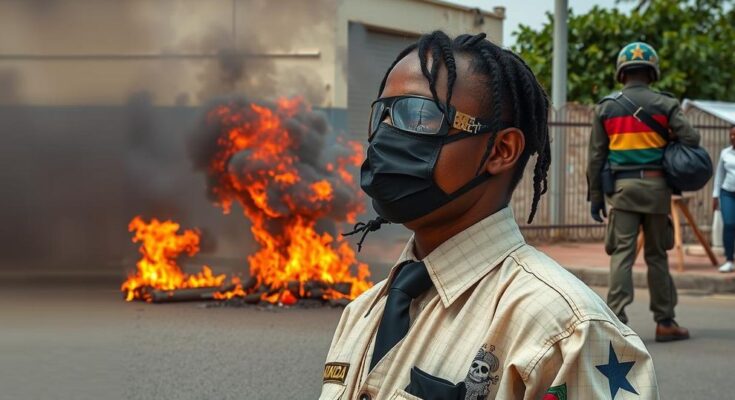Mozambique is engulfed in chaos following the confirmation of the ruling party, Frelimo, as the victor of the recent election, leading to urban riots and the deaths of at least 278 people since the announcement. Allegations of fraud have fueled protests, which have been met with severe crackdowns. The unrest has caused significant economic disruptions and a humanitarian crisis, prompting thousands to flee the country amidst fears of ongoing violence and instability.
Mozambique is currently experiencing intense urban riots and widespread chaos following the confirmation of the ruling party, Frelimo, as the victor of the recent election, which marks its 50 years of governance. Since the Constitutional Council announced the election results on October 9, violent protests have erupted, predominantly in the capital city, Maputo, leading to the reported fatalities of at least 278 individuals, with 176 casualties occurring in the past week alone due to predominantly gunfire. The unrest has prompted responses from security forces, resulting in a severe crackdown on demonstrators, including over 4,200 arrests.
Following Frelimo’s election victory, frustration within opposition groups has escalated as they allege widespread electoral fraud, which they deem a deliberate act of theft. Consequently, opposition protests aimed at the government and electoral bodies have turned increasingly violent, contributing to societal unrest and civil disorder. Amid the upheaval, a significant prison break occurred on Christmas Day, with over 1,500 inmates escaping from Maputo’s central prison, exacerbating the disorder, and resulting in the deaths of several prisoners during clashes with prison staff.
The unrest is compounded by civil fears and economic challenges, as necessary supplies and essential services face severe disruptions, which include rampant inflation on basic goods. Social media platforms have witnessed calls from citizens seeking missing relatives amidst the chaos, highlighting the personal toll of the violence. Daniel Chapo, the elected president, has called for peace and unity during this troubled time, while opposition leader Venancio Mondlane has accused security forces of exacerbating the chaos to justify the imposition of a state of emergency.
As events unfold, the toll on Mozambique’s economy is significant; supply chain disruptions have triggered sharp increases in the cost of living, leading to substantial shortages of essential goods. The disturbance has drawn international attention, with foreign companies now becoming targets of protests. Past elements of stability have given way to roadblocks and operational halts at various commercial sites, leading to significant projected damages amounting to approximately $430 million. The human cost is equally grave, as thousands of Mozambicans have fled to neighboring countries seeking safety and stability during this crisis.
The political landscape in Mozambique has become increasingly volatile due to the dominance of Frelimo, the ruling party that has been in power for five decades. The recent electoral cycle has been marred by accusations of electoral malpractice, leading to widespread public outcry and unrest. The chaos has triggered violence, urban riots, and a humanitarian crisis as security measures intensify and economic conditions deteriorate. This situation reflects broader issues of governance, accountability, and citizen rights within the country, highlighting the profound implications of political strife on both the fabric of society and the economy.
In conclusion, Mozambique is facing a severe crisis characterized by political unrest and violence following controversial election results. The protests signify deep-seated frustrations regarding governance and electoral integrity, while the socio-economic ramifications exacerbate the suffering of the population. As thousands flee the chaos, the call for a return to peace and stability remains paramount amidst escalating tensions and violence in the urban landscape.
Original Source: international.la-croix.com




